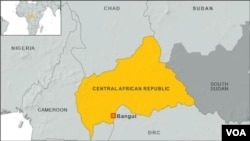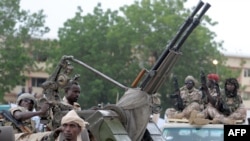DAKAR —
Rebels in northern Central African Republic (C.A.R.) have seized another key regional capital, their fourth in the past two and a half weeks, as negotiations with the government struggle to get off the ground.
A new rebel coalition in C.A.R. launched its offensive in the north on December 10.
The rebel group, known as Seleka, seized the town of Kaga-Bandoro on Tuesday. The rebels are now within 300 kilometers of the capital, Bangui, located near the country's southern border with the Democratic Republic of Congo.
Seleka unites four rebel groups from the north. Many of the fighters were involved in a four-year conflict that officially ended with peace accords in 2007, though fighting has repeatedly flared up in the north since 2009.
The speed and ease with which this united rebel army has seized key towns in the north is raising concern. Analysts say government troops are putting up little resistance.
Chad, a close ally of the President Francois Bozize, has sent in reinforcements.
International Crisis Group Central Africa Director, Thierry Vircoulon, said the Chadian army is the government's "safety net" and it is unlikely rebels will engage them.
He says the Chadian army is deployed strategically around the capital to protect it. Vircoulon says the rebels control about one-third of the national territory right now, however their objective is not necessarily to take Bangui and overthrow the government. He says the rebels have seized key towns to demonstrate their military superiority and put themselves in a strong position at the negotiating table.
The seizure of Kaga-Bandoro on Tuesday came just one day after the rebels had agreed to stop their advance and open dialogue. Rebel leaders have said they do not plan to march on the capital. The government has said it would not negotiate until the rebels pull out of all captured areas.
Six regional leaders, united under the Economic Community of Central African States (ECCAS), say the rebels must withdraw and have offered to hold peace talks in Gabon's capital, Libreville.
Seleka says the government has not respected the peace accords of 2007 and 2011, including provisions to pay rebel fighters and integrate them into the army.
Thousands of civilians have reportedly fled this most recent bout of fighting in the north where insecurity has raged on and off for years.
C.A.R. spokesman for the International Committee of the Red Cross, Vincent Pouget, told VOA from Bangui that fighting has cut cellular phone connection to the region.
He says it is hard to know exactly how many civilians have fled and where they are going, which is making aid efforts difficult. He says some are fleeing to temporary makeshift homes near their fields, while others are fleeing to the bush, neighboring villages or to perceived safe places like a Catholic mission. He said providing clean drinking water and latrines is a key priority to prevent disease.
Doctors Without Borders says it has received reports of violence against civilians, including looting. MSF says many displaced are still too afraid to return home.
A new rebel coalition in C.A.R. launched its offensive in the north on December 10.
The rebel group, known as Seleka, seized the town of Kaga-Bandoro on Tuesday. The rebels are now within 300 kilometers of the capital, Bangui, located near the country's southern border with the Democratic Republic of Congo.
Seleka unites four rebel groups from the north. Many of the fighters were involved in a four-year conflict that officially ended with peace accords in 2007, though fighting has repeatedly flared up in the north since 2009.
The speed and ease with which this united rebel army has seized key towns in the north is raising concern. Analysts say government troops are putting up little resistance.
Chad, a close ally of the President Francois Bozize, has sent in reinforcements.
International Crisis Group Central Africa Director, Thierry Vircoulon, said the Chadian army is the government's "safety net" and it is unlikely rebels will engage them.
He says the Chadian army is deployed strategically around the capital to protect it. Vircoulon says the rebels control about one-third of the national territory right now, however their objective is not necessarily to take Bangui and overthrow the government. He says the rebels have seized key towns to demonstrate their military superiority and put themselves in a strong position at the negotiating table.
The seizure of Kaga-Bandoro on Tuesday came just one day after the rebels had agreed to stop their advance and open dialogue. Rebel leaders have said they do not plan to march on the capital. The government has said it would not negotiate until the rebels pull out of all captured areas.
Six regional leaders, united under the Economic Community of Central African States (ECCAS), say the rebels must withdraw and have offered to hold peace talks in Gabon's capital, Libreville.
Seleka says the government has not respected the peace accords of 2007 and 2011, including provisions to pay rebel fighters and integrate them into the army.
Thousands of civilians have reportedly fled this most recent bout of fighting in the north where insecurity has raged on and off for years.
C.A.R. spokesman for the International Committee of the Red Cross, Vincent Pouget, told VOA from Bangui that fighting has cut cellular phone connection to the region.
He says it is hard to know exactly how many civilians have fled and where they are going, which is making aid efforts difficult. He says some are fleeing to temporary makeshift homes near their fields, while others are fleeing to the bush, neighboring villages or to perceived safe places like a Catholic mission. He said providing clean drinking water and latrines is a key priority to prevent disease.
Doctors Without Borders says it has received reports of violence against civilians, including looting. MSF says many displaced are still too afraid to return home.





